
| Home | Contact Us | Articles |
| Books - DVDs | Stadia Pix | Programme Generator |
An Interview with...
Tony McDonald from Backtrack
In this interview, we talk to Tony McDonald, the publisher/editor at Retro Speedway, which produces two nostalgic magazine and a string of successful books.
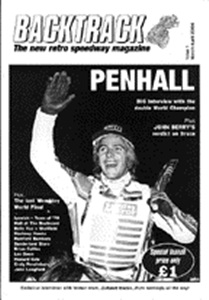
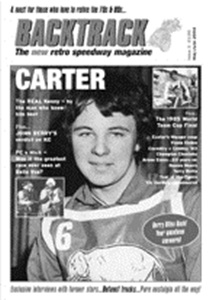
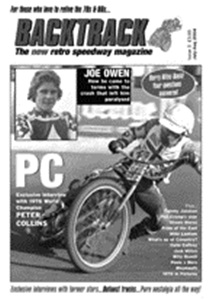
Tell us about Backtrack and what's it all about?
It's a bi-monthly (six issues a year) A4, glossy magazine that we launched almost three years ago, in March 2004. We specialise in tracking down and interviewing former riders and personalities who were involved in speedway during the 1970s and 80s. As well as interviews, the issue is packed with nostalgic features and pictures from this 20-year period.
Where did the idea come from?
I was watching the racing at Rye House with my three kids one day in 2003 when I bumped into Peter Lipscomb, who was at the time co-publisher of the long-established Vintage Speedway Magazine (VSM). Peter's partner, editor John Chaplin, was about to retire to Spain and I was asked if I'd edit and put the magazine together for him -- in other words, keep it going. VSM is produced on a quarterly basis and it was while working on the magazine that I realised what great interest there was in speedway's past. My personal interest is rooted in the 70s, which was the sport's last true golden era and the period that holds the happiest memories for me as a supporter.
I believed that VSM would not be adversely affected by the launch of a new magazine that focused solely on the 70s-80s, that the two titles could co-exist successfully, and, happily, that's how it's worked out.
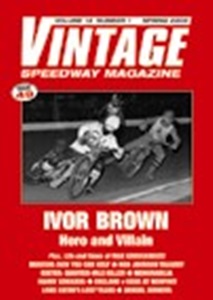
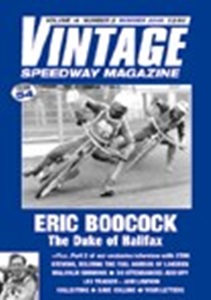
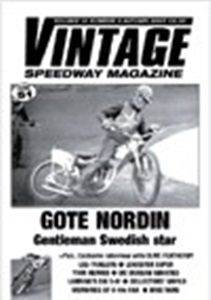
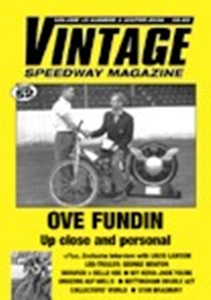
Do you also now own VSM too?
Yes. When Lipscomb emigrated to Thailand, he initially passed overall control of the magazine to an avid speedway historian, Allen Trump, who many will know as the driving force behind the Exeter revival. But Allen had his hands full running his own businesses and, when he saw that we had already started up Retro Speedway and were producing Backtrack, he was happy to hand everything over to us, to ensure VSM not only survived but progressed.
How would someone distinguish between your two magazines?
There is a crossover of readership to some extent but, by removing all post-60s coverage from VSM and confining that era to Backtrack, the two magazines have their own identity. Previously, there was perhaps a feeling that VSM was trying to be all things to all men but now it covers everything in speedway from the pioneer days until the end of the 60s. In fact, Backtrack and VSM both feed off each other now, thanks to the way we can easily cross-promote under our Retro Speedway banner. We have no intention of merging the two - they are successful in their own right.
Getting back to Backtrack, which riders have you interviewed so far and who were your particular favourites?
We have tended to adopt our front cover man as the main subject for an in-depth interview. Bruce Penhall was that man for our launch issue and since then we've interviewed great names and other stars such as Ivan Mauger, Peter Collins, Hans Nielsen, Anders Michanek, Michael Lee, Phil Crump, John Louis, Malcolm Simmons, Chris Morton, Bobby Schwartz, Scott Autrey, Gordon Kennett and many, many more. Ray Wilson is next.
It was great to sit down with Ivan, who is the greatest rider of all-time in my view, in a small, quiet pub just across the road from where his British career began at Wimbledon, and look back over his career.
Visiting the homes of Mike Lee, Mort and Crumpie was also something special but perhaps the most pleasing one was Anders Michanek, whose delightful farmhouse is tucked away in a forest on a Swedish island of just 300 inhabitants. Anders was genuinely amazed that I'd traveled all that way, on a one-day return flight to Stockholm, just to interview him. And after a few hours in his company, enjoying his cold beers and a fresh salmon at his local restaurant across the bay, to which we travelled in his little speed boat, I too was amazed - and disappointed - that I hadn't planned to stay longer!
The great thing about interviewing guys like Lee and Mich is that, as former riders, they can talk much more freely and provide very candid copy, simply because they don't ride anymore. They can look back and analyse what happened - good and bad - in a completely different light. I mean, Jason Crump and the other big stars of today would obviously have a lot more interesting things to say if you asked them questions about their career in 30 years time. Jason's not going to tell Speedway Star next week that his promoter is a fool or that he can't stand the sight of one of his team-mates, or admit to a weakness or hang-up that might boost one of his main rivals.
But the ex-riders can more or less say what they want, and that's the key to getting good quotes from them. They can be candid without worrying about who they might upset, although Reg Fearman did threaten to sue us over a comment Mike Lee made!
Actually, having been around speedway all his life, I must say Jason has a great appreciation of the sport's history. He subscribes to Backtrack and has also bought most of our books. And World Champion or not, he always insists on paying. Likewise, Ivan Mauger retains a great enthusiasm for the sport's heritage. He is enthusiastic about Backtrack and has helped to put us in touch with several ex-riders.
Imagine how lucky I am - a fan who first started going to speedway in 1970 at the age of 10 who now finds himself asking probing questions of my former heroes, riders I'd only seen from the terraces and had never previously met. It's a great privilege and while I've never been star-struck, having interviewed many famous football names over the years, there's a great feeling of anticipation whenever I ask a question of an ex-rider that I don't know the answer to.
We're not only interested in talking to the former superstars, though. For instance, we've highlighted the plight of a number of disabled ex-riders in a series of interviews with those who became wheelchair-bound after bad accidents. These features can often be both moving and inspirational.
We've published memorials to riders who lost their lives on the track. And we also focus a lot on unsung heroes and lesser known riders who have otherwise largely been forgotten.
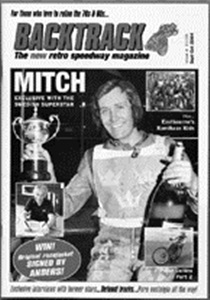
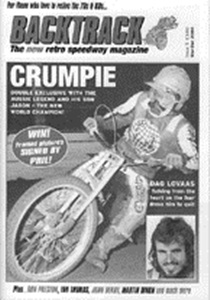
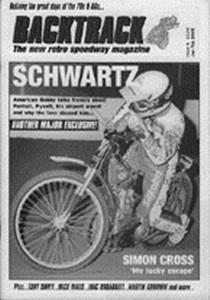
How do you set about making contacts with riders, officials and others who have long since disappeared from the speedway scene?
It's not too difficult to track people down, although it helped that I kept all my address and contact books that I had from the time I spent as editor at the weekly Speedway Mail, between 1978 and 1991. The Veteran Speedway Riders' Association directory has been a help and you tend to find that one useful contact leads to another. Speedway people are very helpful.
Mind you, there are still plenty of former riders who we're still trying to trace - Garry Middleton for one. He'd make a great interview subject, so if anyone can help to put us in touch with him, we'd very much appreciate it. Our regular contributors, like Martin Neal and Richard Bott, go back to the 70s and 80s too, and it's great being involved with quality, professional journalists like them again all these years later.
Do you accept unsolicited articles or features from contributors?
We do, but they need to be of a certain standard and, preferably, via email - we don't employ an in-house typist! We've received some interesting, well written copy from unknown contributors - supporters who want to share their fond memories with others - and that's always welcome.
Where do you get your photographs from?
We now own virtually all the pictures we use, having paid a five-figure sum for Alf Weedon's complete speedway collection, which dates from the late 40s to the late 90s. We also have a good relationship with all the other speedway photographic sources, like John Somerville and Mike Patrick, plus others who work on a more regional basis. There's something so evocative and atmospheric about a good black and white picture.
We're now in the process of making many of our pictures available for readers to buy copies of.
Why did you make John Berry your lead columnist?
Because he is one of the best speedway scribes around today. John contributed some of the best articles to appear in VSM when I first got involved with that, so I wanted him to be a big part of Backtrack from the off.
The thing about JB is that he writes very well and with an authority that no other writer really can. He's been there and done it with both Ipswich and England, and he has known or has had dealings with just about everyone we write about in the magazine. His profile of Billy Sanders in issue 17 was superb. I was a little concerned that he might be too close to the subject matter but I don't think anyone who reads what John has written about Sanders can question his ability to articulate his thoughts and put them across very well in print. Confessions of a Speedway Promoter has been a great success, widely acknowledged as the best speedway book for many a year, if not ever.
I just wish people would put aside any prejudices they may have of John, based on his reputation from his hard-nosed, no-nonsense days as Ipswich boss and a leading BSPA figure, and respect him for the excellent writing he produces now.
Has he not rubbed some people up the wrong way, though?
So what? The people who are most easily offended by what John says or does are usually those who simply don't like to hear what he has to say. He has an underestimated sense of humour, is usually good for sound advice and I know that he cares deeply about Backtrack and its future. He also still cares very much about British speedway - you only have to read his books to appreciate that.
In his new book, More Confessions, he explains at great length where speedway has gone wrong in the past and how he believes it should go forward in the future. But he calls a spade a spade and I'm sure John Postlethwaite and BSI won't like what JB has to say about the way speedway is run and governed in Britain.
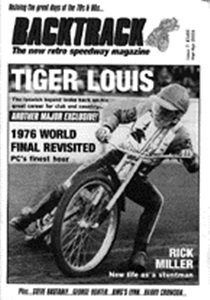
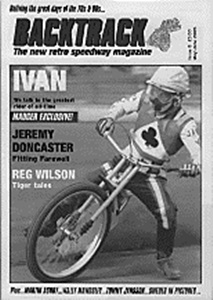
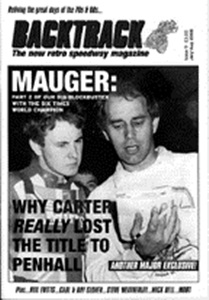
So where exactly is Backtrack going?
Onwards and upwards. We gained a very healthy number of readers very quickly but we still have a long way to go before we reach our optimum sales potential. Retro Speedway is just a very small two-person operation - my partner, Susie and I produce everything from our home in Essex and we operate on a shoestring with no financial backing. With no significant marketing budget, we have to build the business steadily and, I must admit, I sometimes get a bit frustrated and impatient with the growth rate. We can't do everything we want to at once but we're getting there.
Last summer, from issue 15 onwards, we ran full colour over eight pages and that improvement has gone down very well with readers.
We gain new subscribers every week, which is encouraging, and our Retro Speedway website has been a big help in that respect, although we have plans to improve the quality of the site too.
We know there are still many thousands more people out there, including fans who have stopped going to speedway, who would really enjoy the magazine if only they knew about it. We spend quite a lot of money each year advertising in Speedway Star but we've found that a fair proportion of our readers don't buy the Star or even go to speedway now on a very regular basis.
That's an area where we need to work even harder in the next few years - promoting our product to a wider audience and getting around to more tracks all over the country. Reaching supporters who have been lost to the sport is a tough nut to crack, though (ask the BSPA!), but we'll keep searching for them, because we all know from 70s attendance figures that there are thousands and thousands of them out there somewhere who would enjoy the reading about speedway in days gone by.
Any plans to change the frequency of Backtrack - maybe take it monthly?
Not in the forseeable future. We canvassed our subscribers in a survey and the feedback was that they like the bi-monthly frequency. A subscription of just £16 for six issues is good value but if you double the output, then £32 a year is pushing the limit of what many people can comfortably afford.
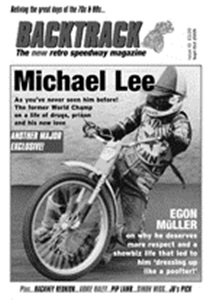
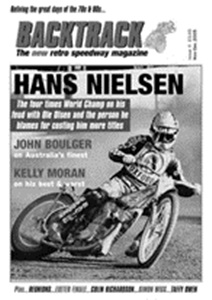
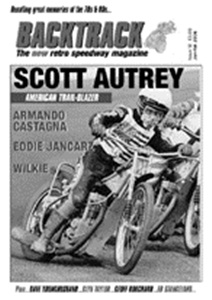
How would you define Backtrack readers?
Our typical reader is aged between 40 and 65, with a genuine passion for the sport but who looks back at the past with even greater affection. We live in a society that loves nostalgia. Whether the world really was a better place then compared to now is open to debate, but many of us like to think it was better, and that's the point. If you loved speedway in the 70s and 80s, then we like to think you'll enjoy Backtrack and what it represents. We're talking packed crowds, big name national sponsors, ITV coverage, plenty of dirt on tracks, real characters and 'Happiness was 40-38'!
If you close your eyes, you can still 'feel' speedway in that era - the smell, the buzz of big crowds, the many now sadly defunct tracks we all used to enjoy visiting. And when you think about these things that meant so much to you, your mind transports you back to your youth, when everything seemed so much better and people were happier. That may sound a bit deep but I suppose, in a way, it's what Backtrack is all about - rekindling memories of a better time and happier days. There seem to be so many more things in life now that irritate people, so we tend to welcome the opportunity to remind ourselves of our youth.
We try to interract with our readers as much as possible and are always approachable. It's important to know what they want from the magazine, which means spending some time with them on the phone or engaging in email correspondence, or communicating via the internet forums.
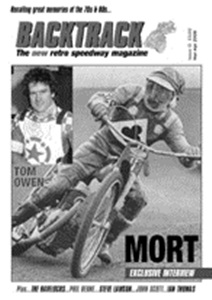
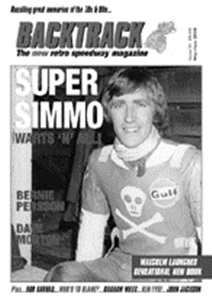
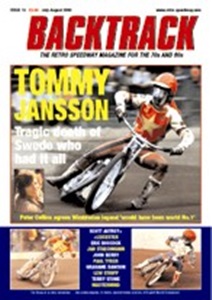
Apart from John Berry's books, you've published a number of other titles in recent months and years.
The Simon Wigg book - Wiggy! - has gone very well and it was lovely getting to know Simon's widow Charlie and his brother Julian, who gave us wonderful help and support. But Simmo: The Whole Truth by Malcolm Simmons looks set to at least match the sale of Berry's first book. It's always very refreshing to work with someone as outspoken and controversial as Berry and Simmo, because they call it as they see it - whether or not you agree with or like what they're saying.
I'm proud of all our books, for different reasons, and I don't hesitate to boast that nobody produces speedway books better than we do. There are a lot of speedway books out there but, unfortunately, not a lot of them are much good. We've set high standards and while you'd obviously like one or two of them to sell a bit better than they have, we won't compromise on the quality of our products.
So what books are you planning for 2007?
I've just started work on writing a biography of Kenny Carter, which we'll publish in June. Our book distributor has already had an unprecedented number of advance orders for it and it could be our biggest project yet.
After launching Backtrack with Penhall on the cover, it was only natural that issue 2 should feature a powerful piece on Carter - and that issue, like the first, has also now sold out. Whether you loved him or loathed him, Carter always evokes strong feelings and speedway was much the poorer for the loss of both him and Penhall in the early 80s.
We have a list of other possible book ideas, but we'll have to see what develops. As far as we're concerned now, it's quality over quantity.
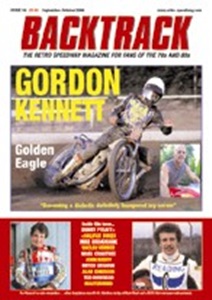
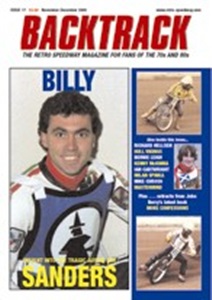
Finally, what would you say to anyone reading this, who is thinking about becoming a regular reader of Backtrack?
Get in touch straight away! Seriously, if anyone would like to sample a copy before committing themselves, as a goodwill gesture we will send a FREE COPY of a recent issue to the first 100 people who email me at editorial@retro-speedway.com. I like to think that once they have seen it for themselves, they will become subscribers.
This article was first published on 19th January 2007

"Although I'm now 57 I still have many fond memories of the riders from the 60's on. I was interested to see Peter Lipscomb mentioned, I spent many an evening at Aston Clinton discussing various issues, but he still always managed to sell me something! Still whilst pondering one of my memories was of Colin "Joe" Gooddy chasing Bengt Larsson at Cowley after what he thought was OTT! And then throwing a punch whilst BL still had his helmet on."
"I have to date not seen a copy of the Backtrack publication, but certainly Tony McDonald is very enthusiastic of his product and I will try to obtain a copy in the near future. I haven't seen a recent copy of VSM either so I will try to see that one as well.
My own particular memories go back to the late 50's and 60's when living in Coventry and following the Bees. I lived up until last August in Weymouth so was certainly involved with Weymouth (and Poole when Mervyn moved up To Wimborne Road). I was Pit Marshal at Weymouth until last year but now having moved up into Wiltshire am going to miss the involvement with the new Promoters sadly.
As a Printer I must say I look forward to the production of Speedway Plus as a Web Magazine, you produce a good product. I formerly ran Warwick Press in Weymouth, who, as you may know produced programmes for Weymouth, Poole and the recent Weymouth one untill Brian White downgraded the product and photocopied it himself, as well as some of the Conference League isues in the time of Alan Hodder.
Speedway is a great family sport and I have met so many people over the years, that on occasions come flooding back to mind, from riders like Pete Lansdale and Aub Lawson who always appeared so old, to youngsters who even now are retired from an active participation in the sport. As well as so many people with whom I have enjoyed friendly rivalry on the terraces. I actually went to school with Tony Lomas in Coventry, so you can imagine my vinatge. Keep up the good work."